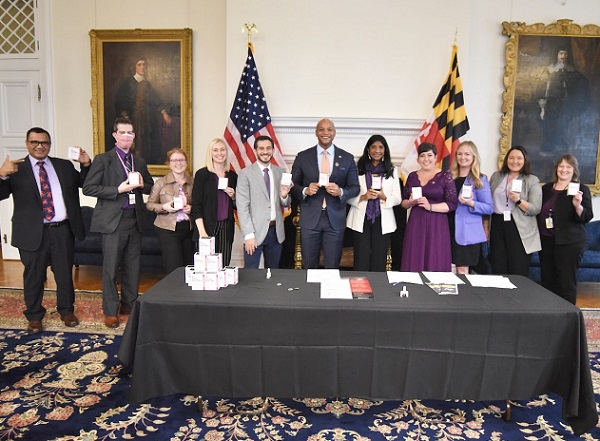ANNAPOLIS, MD—On Friday, Governor Wes Moore and Lieutenant Governor Aruna Miller received a training on overdose response and using the opioid overdose reversal medicine naloxone at the State House. They also recognized September as National Recovery Month and reiterated the administration’s support for increasing access to substance use treatment and recovery services.
“Every Marylander has the ability to save a life,” said Gov. Moore. “We can all do our part by learning how to respond to an overdose and by carrying naloxone. My administration is also working hard to increase access to life-saving care for people with substance use disorders throughout the state, because everyone deserves access to mental and behavioral health services.”
“Overdose has touched so many Maryland families, including my own,” said Lt. Gov. Miller. “We need to create a seat at the table for everyone as we continue to identify ways to reach those who need support. Whether it’s state government, community organizations, local partners, or individuals, we all have a role to play in combating the overdose crisis and saving lives – and we can all start by carrying naloxone and recognizing the signs of an overdose.”
Lt. Gov. Miller currently chairs Maryland’s Inter-Agency Heroin and Opioid Coordinating Council, which works to increase collaboration and data sharing between state agencies that are working to address the overdose crisis.
Marylanders can learn more about obtaining naloxone, recognizing and responding to opioid overdoses, and details regarding Maryland’s Good Samaritan Law by visiting https://beforeitstoolate.maryland.gov.
Marylanders who are struggling with substance use are encouraged to call or text the National Suicide and Crisis Liveline, 988 to get connected to substance use and behavioral health resources.
The Moore-Miller administration also announced additional funding to support state, local, and community programs addressing the crisis. Maryland’s Opioid Operational Command Center is distributing $10 million in grant awards today through its block grant and competitive grant programs. The awards will support initiatives in FY24 to reduce overdose deaths in each of Maryland’s 24 local jurisdictions. Private and nonprofit organizations and state and local government agencies across Maryland will receive $6 million in competitive awards. Local jurisdictions will receive $4 million through block grants.
“The programs we are supporting this year address overdose mortality from all angles,” said Special Secretary of Opioid Response Emily Keller. “By advancing priorities from prevention and reducing the harms of substance use to promoting connections to treatment and recovery resources, we are confident that these programs will make a difference in the lives of people in all Maryland communities.”
The Opioid Operational Command Center’s block grant program provides funding to every local jurisdiction in Maryland through its Opioid Intervention Teams. Funding through the program is based on a formula that considers the local impact of the opioid and overdose crisis while ensuring that each jurisdiction receives a base amount of support for overdose prevention programming.
The center is also awarding 35 proposals through its competitive grant program. Competitive awards support nonprofit organizations, local health department programming, and programs implemented by state agencies and other local government entities, such as local school systems. Nine projects supported through Opioid Operational Command Center competitive grants will serve multiple jurisdictions.


